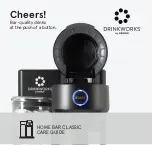
15
8-MAINTENANCE
WARNING: DISCONNECT THE POWER BEFORE SERVICING THE LIFT.
IMPORTANT: THE MAINTENANCE INTERVALS INDICATED BELOW APPLY TO
AVERAGE WORKSHOP USE. THE LIFT SHOULD BE INSPECTED MORE FREQUENTLY
FOR SEVERE USE APPLICATIONS.
It is important to keep the lift clean, dry, lubricated and well maintained by establishing a periodic
preventive maintenance program to ensure trouble-free operation and long service life.
1.
Check safety locking mechanism is functioning correctly.
2. Check safety lock audibly and visually while in operation.
3.
Check safety latches for free movement and full engagement with rack.
4. Inspect the condition of rubber lifting pads and replace as necessary if worn or torn.
5. Check hydraulic connections, and hoses for leakage.
6. Check chain connections - Bends, cracks - and looseness.
7. Check for frayed cables in both raised and lowered positions.
8. Check snap rings at all rollers and sheaves.
9. Check bolts, nuts, and screws and tighten.
10. Check wiring & switches for damage.
11.
Keep base plate free of dirt, grease or any other corrosive substances.
12. Check floor for stress cracks near anchor bolts.
13.
Check swing arm restraints.
1.
Check anchor bolts torque to 85 ft-lbs for the 3/4’’ anchor bolts.
NOTE: DO NOT USE IMPACT WRENCH.
2. Check floor for stress cracks near anchor bolts.
3. Check hydraulic oil level.
4. Check and tighten bolts and nuts, and screws.
5. Check cylinder pulley assembly for free movement or excessive wear on cylinder yoke or
pulley pin.
6. Check cable pulley for free movement and excessive wear.
8.1 MAINTENANCE SCHEDULE
8.1.1 DAILY
8.1.2 WEEKLY
Summary of Contents for HD2P-13KCL
Page 25: ...21 FIG 1 HD2P 13KCL 117 50 142 75 151 00 4 72 75 32 45 50 11 DIAGRAMS FIG 1 8...
Page 26: ...22 FIG 2 HD2P 13KCL Column Anchor Bolts 3 4 6 25 Column 6 Concrete 3000PSI min Torque Nut...
Page 32: ...28 FIG 8 CABLES HOSES...
Page 35: ...31 NOTES...
Page 38: ......
Page 39: ...NOTES...
















































